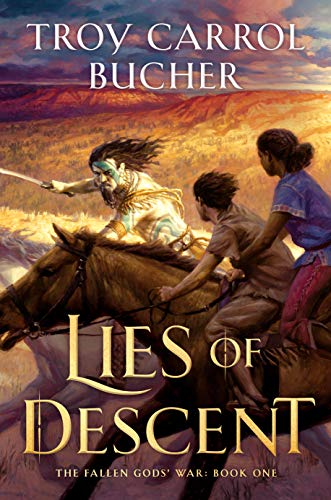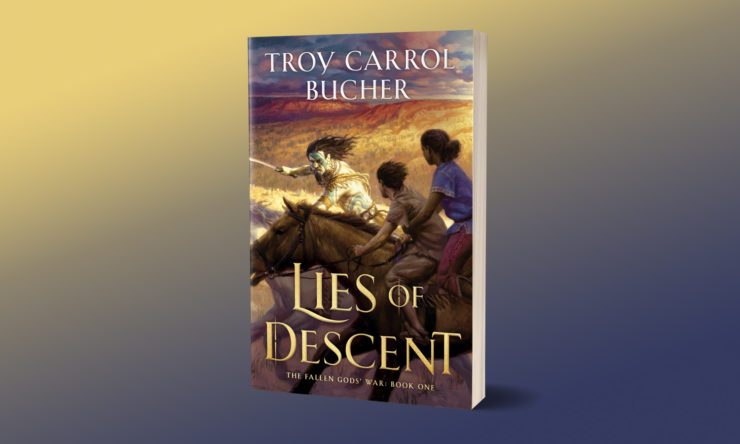You’ve heard this narrative before. Young people chosen because of a special bloodline, a special talent, a rare ability or heritage that they themselves don’t know about. Gather these special people, bring them to an isolated space, be it in the mountains, the world next door, a remote island. Possibly one or two of the chosen have an even more special talent than the usual. Train them in their heritage, preparing them to face against a threat to themselves, and possibly the entire world. It’s a well worn path for a SFF novel to take. Or Star Wars, for that matter.
In Troy Carrol Bucher’s epic fantasy novel Lies of Descent, first in The Fallen Gods War series flips that script and its expectations, early and often.
The novel focuses early and strongly on Riam, a twelve-year-old who lives on a dirt poor farm with an abusive father. In a short opening chapter, the book makes it clear just how bad Riam has it at home. So when the Draegoran Gairen shows up and announces that Riam is of that martial heritage and that he is taking him to fulfill that heritage, it’s meant as a relief. The grimdark nature of the novel is reinforced as Riam’s father is promptly killed for resisting the order. But the lines seem familiar. Riam will go to the island of Doth Draegoras and get his training to become a Draegoran along with the other children similarly chosen. They will stand against the Esharii tribesmen who threaten civilization. In the name of the God of Light, this is their charge and duty.
Nola is given less spotlight at the start of the narrative. She comes from a loving, prosperous family, a far softer life than Riam. Her initial shock at being torn away from all that she knows, from a good life to an uncertain and harsh military one as a Draegoran, is greater than Riam’s reaction. I do think, though, that there is a power and a concentration of writing in Riam’s introductory chapters that Nola simply lacks. In the beginning of the novel, Nola seems to exist mostly as a reflection on Riam’s much less fortunate former life.
Riam and Nola’s journeys do not go as planned, in fact, they go off course relatively early. An attack by the Esharii reveals that Riam indeed is more powerful than expected, with unexpected preternatural ability. Nola, on the other hand, is carried off successfully by the Esharii and dwells in the camp of the enemy from that point forward. While Riam, having had a tough life, might stoically try and survive the tribulations thrown at him, Nola finds her reserve and inner strength as her status, and the reason for her abduction only slowly become clear to the reader, and more slowly still to Nola herself. Even as the narrative continues, the machinations of forces beyond Nola and Riam’s control continually throws rocks in the ever changing path they find themselves on, a series of defied expectations as to how the narrative will play out. I appreciated the fractiousness of both sides of the conflict, providing plenty of potential for conflict.
The novel’s grimdark nature and ethos are not limited to the beginning. This is a book where terrible things happen to ostensibly good people. Even people ostensibly working with the best of intentions do some rather questionable and difficult things. There is an extended sequence where Riam gets literally branded as a criminal slave—a churp—and is assigned to the bottom of the social hierarchy with an abusive master. The novel does draw parallels between Pekol, Riam’s master, and Riam’s experience with his father. It makes for rather unpleasant reading at times. Overall, the novel could do better by its female characters. There are some female walk-on roles and a veneer of an egalitarian nature to the Draegora. However, the Esharii are far more patriarchal, with Nola being a very isolated exception. Nola’s experience with the Escharii thankfully avoids a stereotypical to-be-avoided fate for her and instead puts her on a path of esoteric knowledge and power.
On that note, there is some strong thought brought to the esoteric side of the worldbuilding. The true knowledge is not at all clear to most of the characters, and it is a tension that drives a lot of the long standing conflict between the two forces. There are some pre-chapter bits of worldbuilding and some exposition, especially on the Esharii side on the conflict, as to the nature of the cosmic set up. There is a nice tension between what the characters, both the Draegorans and Escharii, know and what the reader can figure out from both sides, and from the inter-chapter material. Other parts of the worldbuilding and narrative, though, are a little less well thought out.
The author’s even more abiding interest are the strong action beats and the earthy, grounded descriptions of physical action. Be it through the quick and brutal death of Riam’s father, the grind of the Riam’s aforementioned churp existence, or, more strikingly, the fights and conflicts, the novel hits its stride. The novel has a variety of set pieces and situations, from running battles to up close and personal brutality. The best of this is an attack on a Draegoran encampment by the Esharii, filtered down through Riam’s limited point of view quite successfully. The novel spends a lot of pages on this sort of action and I appreciate the detail the author put into that aspect of the book. Readers who want lots of gritty action, and not just the same repeated action, are really going to be enthused with what the author does in his set pieces.
Buy the Book


Lies of Descent
I did have other issues with the text, especially Nola’s story and an event in the book whose implications and nature the author seems not to have fully thought out. At one point, in part of her own initiation and training among the Esharii she is now a part of, she engages in a series of visions and life experiences down multiple timelines, wrapped into a relatively short period, in a manner very similar to Doctor Strange in Avengers: Infinity War. However, unlike Doctor Strange, Nola ages for the time spent in such alternate and would-be future timelines. The upshot is that by the time her journeys are complete, she has aged a number of years, going right into adulthood. This gives her more agency and more experience than she, a girl of 12, would have had in her roles in Escharii life but there is never any real sense or internal consideration of the costs to her, psychically, physically, or otherwise. We get about a paragraph of reflection on this life changing event that I think that most people would spend much more time dealing with the ramifications of, to mind, body and soul.
The novel also seems to have a “rabbit as a smerp” sort of approach to the descriptions of a chunk of the wildlife. I am glad this doesn’t extend to every creature in the novel, but it’s enough that I noticed. I also am not a fan of apostrophes for only the sake to differentiate names and cultures without any rhyme or reason otherwise to seemingly require them. I don’t think that names like Ni’ola (which Nola gets renamed to) or Ky’lem are significantly more useful with the apostrophes than the names without apostrophes would be.
I can see where the series seems to be going, with the hints in the narrative as to how the conflict is really set up. The machinations of the Wolf regiment against their fellows, their grab at temporal power and suzerainty over their fellow Draegoran regiments is really a veneer over the fundamental nature of the relationship between the Draegorans and Esharii. The internal conflicts among the Esharii, especially once Nola/Ni’ola enters into their culture, also act as a veneer. Again, I can see some interesting elements here, but I am not make inclined to recommend the book save for the most completist of grimdark fantasy readers. Such readers looking for every ounce of grimdark fantasy extant will find much to love here in the book, especially on the action beats. As for myself, I am not inclined to continue the series.
Lies of Descent is available from DAW.
An ex-pat New Yorker living in Minnesota, Paul Weimer has been reading sci-fi and fantasy for over 30 years. An avid and enthusiastic amateur photographer, blogger and podcaster, Paul primarily contributes to the Skiffy and Fanty Show as blogger and podcaster, and the SFF Audio podcast. If you’ve spent any time reading about SFF online, you’ve probably read one of his blog comments or tweets (he’s @PrinceJvstin).










